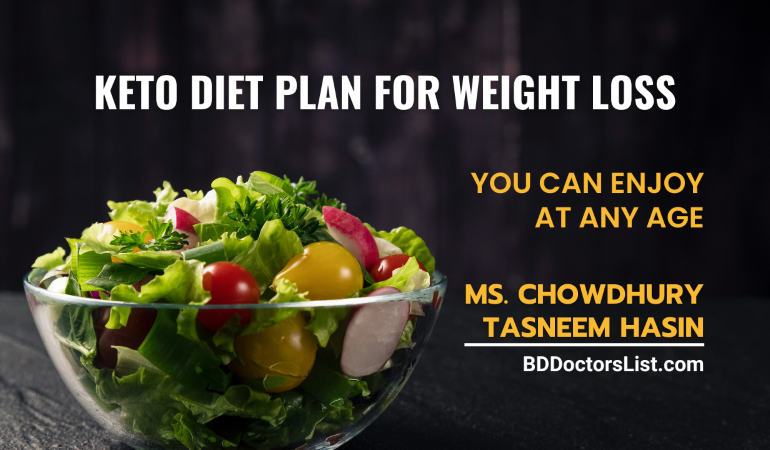What is a Keto Diet plan?
The keto diet plan is a low-carbohydrate, high-fat diet that has become increasingly popular in recent years. The aim is to put your body into a state of ketosis, where it begins to burn fat for fuel instead of carbohydrates. By following this plan, many people have reported significant weight loss due to the reduction in overall calorie intake. But proper monitoring under a clinical dietician is a must.
The keto diet plan typically involves reducing carbohydrate consumption to less than 50 grams per day and increasing fat intake significantly. This can be achieved by consuming foods such as meat, fish, eggs, nuts and seeds while avoiding high-carb foods like bread, pasta and sugar.
While there are potential benefits to following a keto diet plan for weight loss, it's important to consult with a healthcare professional before starting any new diet or exercise routine. Additionally, it’s essential to ensure that you are still getting all of the necessary nutrients your body needs by incorporating plenty of vegetables and other nutrient-rich foods into your meals.
How Does the Keto Diet Work?
The Keto diet, also known as the ketogenic diet, is a low-carbohydrate and high-fat diet plan that has become increasingly popular in recent years. The main idea behind the keto diet is to enter a state of ketosis where the body burns fat for energy instead of glucose from carbohydrates. By drastically reducing carbohydrate intake, the body is forced to use fat as its primary source of fuel.
When you consume fewer carbohydrates than your body needs for energy, it turns to stored fats instead. This process produces molecules called ketones, which are use by organs for energy. As a result, the keto diet can lead to significant weight loss due to decreased hunger and increased satiety.
However, it’s essential to note that while the keto diet can be effective for weight loss, it may not be suitable for everyone. Also the longevity of keto diet should not exceed 15 days. Those with medical conditions such as diabetes or high blood pressure should
consult their doctors before starting this type of eating plan. Additionally, long-term adherence to strict dietary restrictions must be considered when attempting any form of weight loss program.
Foods to Eat on a Keto Diet
A keto diet emphasizes high fat, moderate protein, and low carbohydrate intake. The aim is to put the body in a state of ketosis where it burns stored fats for energy instead of carbohydrates. Some recommended foods include meat, fish, eggs, butter and cream, nuts and seeds, healthy oils (coconut oil), non-starchy vegetables (broccoli), avocados, berries and low-carb fruits like tomatoes.

One important food category on the keto diet plan includes protein-rich foods such as poultry (chicken or turkey), beef or mutton. They are perfect sources of amino acids necessary for muscle growth and repair. Another vital food group consists of healthy fats such as olive oil or coconut oil which provide essential fatty acids that help regulate hormones responsible for weight loss.
Lastly, non-starchy vegetables like cauliflower or spinach provide fiber that helps with digestion while also contributing significantly to daily nutrient requirements. Additionally they deliver vitamins A and C which are essential for maintaining good health during the transition period into ketosis. Overall, these foods are excellent choices when following a ketogenic diet due to their high nutritional value while still being low in carbs.
Benefits of a Keto Diet Plan
A keto diet plan is known to be effective for weight loss, due to the low-carb, high-fat intake that creates a state of ketosis in the body. This means that the body uses stored fat as its primary source of energy instead of carbohydrates. By reducing carbohydrate intake, insulin levels decrease, and the body burns fat for fuel. This reduction in insulin also helps to suppress appetite and reduce cravings.
Aside from weight loss, a keto diet plan has numerous other benefits. It can improve heart health by lowering triglyceride levels and increasing good cholesterol (HDL) levels. A keto diet plan may also help manage type 2 diabetes by improving blood sugar control and decreasing symptoms associated with metabolic syndrome.
Potential Risks of a Keto Diet Plan
One potential risk of a keto diet plan is the possibility of nutrient deficiencies along with kidney malfunctions. Since this type of diet focuses on protein and fat, it can be easy to miss out on essential vitamins and minerals found in fruits, vegetables, and whole grains. This can lead to malnutrition and other health problems if not properly monitored.
Another concern with a keto diet plan is the risk of dehydration. The body uses up glycogen stores when transitioning into ketosis, which can result in increased water loss through urine. It’s important to drink enough water and replenish electrolytes regularly to avoid dehydration-related issues such as dizziness or fainting. Foggy brain is also a n alarming side effect.
Lastly, a keto diet plan may also pose risks for individuals with certain medical conditions such as liver disease or pancreatitis. It’s crucial for anyone considering this type of diet to consult with their clinical dietician beforehand to assess any potential risks based on their individual health history.
Tips for Starting a Successful Keto Diet
- Start by understanding the basics of the keto diet: A successful keto diet plan for weight loss involves consuming high amounts of healthy fats, moderate protein intake, and low carbohydrates. It is essential to understand the concept of ketosis – a state where the body burns fat for energy instead of glucose –to achieve desired results.
- Plan your meals: Meal planning is crucial when starting a keto diet. Begin by making a list of foods that fit within the parameters of this eating plan and create meals that include healthy fats such as nuts, avocado, coconut oil, olive oil and proteins like eggs, meat or fish.
- Monitor your carb intake: One of the most important aspects of a successful keto diet is keeping track of carbohydrate consumption. It’s beneficial to aim for less than 50 grams per day because even small amounts can disrupt ketosis.
- Stay hydrated: Proper hydration is crucial on any diet but especially on a ketogenic one since it tends to dehydrate you more than other diets due to low-carb intake; drink at least 8-10 glasses daily.
- Exercise regularly: The benefits associated with exercise are numerous including boosting weight loss success in combination with proper nutrition without feeling deprived or overeating high-calorie foods that will throw off ketosis levels!
- Seek support from others who have experience with Keto dieting and join forums/communities where you can ask questions and share advice about meal planning ideas or snacks if needed!
Is the Keto Diet Right for You?
In conclusion, the keto diet may be an effective weight loss tool for some people, but it is not a one-size-fits-all solution. It requires a commitment to drastically reducing carbohydrate intake and increasing healthy fats, which can be challenging for many individuals. Additionally, those with certain medical conditions or who take certain medications should consult with their healthcare provider before starting the keto diet.
Furthermore, while initial weight loss on the keto diet may be significant, research suggests that long-term adherence to this eating plan may be difficult. It is important to consider incorporating a variety of nutrient-dense foods into your diet for optimal health and sustainable weight loss.
Ultimately, whether the keto diet is right for you depends on your individual goals and preferences. Consulting with a registered dietitian can help you determine if the keto diet aligns with your lifestyle and nutritional needs.
Written for BDDoctorsList.com
Written By
Ms. Chowdhury Tasneem Hasin
Nutritionist and Diet Specialist
Chief Clinical Dietitian,
United Hospital Limited, Dhaka, Bangladesh
Date: 14th May 2023

